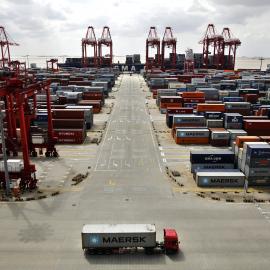To the Editor:
Marcus Noland correctly points out that neither the president nor Congress is taking on the growing protectionist sentiment ("Learning to Love the WTO," September/October 1999). With the new round of trade talks recently initiated at the World Trade Organization (WTO), what needs underscoring are the two biggest issues in trade policy that confront the United States: the trade deficit and trade wars.
Trade deficits of the magnitude America is experiencing are new to U.S. economic planners -- and taming these deficits is an uncertain possibility. Because the trade deficit will reach about $255 billion this year, the risk is increasing that foreign investors will find other, safer places to invest. The market-opening measures signed with China should improve the trade gap, which may level off soon. But these cycles are uneven and the deficit may increase yet again in early 2000.
How can Americans keep the economy afloat and maintain their buying power? The solution is fairly simple: keep trade barriers down and production up. The result would be a greater balance in global trade, with Japan, China, and western Europe buying more American products and services.
Regardless of the damaging effects, the international system has never witnessed so many retaliatory global trade disputes -- from beef hormones to steel, lamb, genetically modified food, and trademarks. Trade conflicts were led by the battle over bananas and sanctions, which caused our trading partners to threaten not to buy American goods -- illustrated most vividly when protesters occupied the McDonald's in Auch, France. This cycle caused Federal Reserve Chairman Alan Greenspan to declare his "concern" recently for Congress' weakening support of trade liberalization.
American trade unions argue with some authority that the majority of American workers have not benefited from global trade, citing the decline of wages, child-labor violations, and environmental problems that are not enforced in global trade agreements. Add an election year and it will be difficult to get done what U.S. trade negotiators should do in the next round of global negotiations: cut tariffs and liberalize trade, enforce antidumping rules, and ensure that these rules incorporate both enforceable workers' rights and environmental protections.
Ultimately, the way to deal with the growing trade deficit is to promote exports, but not by limiting imports. The WTO's new millennium round could still be a start -- if U.S. negotiators follow up with a plan and with enough resolve to support Americans' belief that they must benefit from market liberalization.
PAMELA S. FALK
Professor of International Trade and Commercial Transactions, Queens College School of Law
